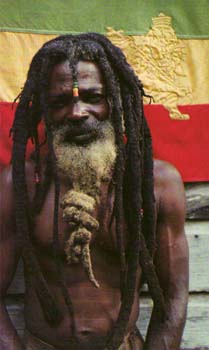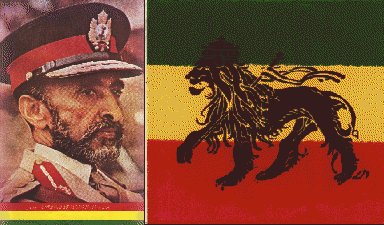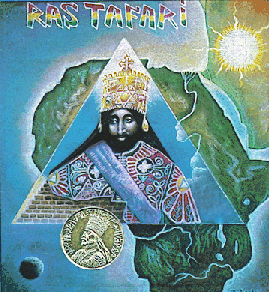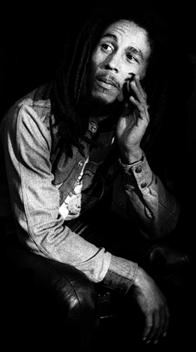

Rasta Culture … Legacy of
The Lion in Zion
Saturday, May 05, 2001
Presented By: Karen Duncan
Rasta Culture … Legacy of
The Lion in Zion

Why does the existence of the Rastafari movement seem to elicit frowns of disapproval and shudders of distaste from mainstream society? Why??? The response to this is at once simple yet complex. Human beings have sought knowledge incessantly throughout history in order to ‘know’ things. There is an inherent and diabolical fear of the unknown or mysterious elements of life, which grips the heart of man and demands a reaction — positive or negative. The senses see and respond to the familiar favorably, while everything else is relegated to the realm of being unacceptable, until approved, deliberate steps are taken to adopt societal standards or norms. The core of the disapproval visited upon the movement is thus a result of fear of the unknown.
When Jamaican blacks embraced Emperor Haile Ras Tafari Selassie 1 of Ethiopia as their King of Kings and Lord of Lords in the 1930’s, the unique identity referred to as ‘Rastafarian’ was born. Rastas describe themselves as "righteous Abyssinians awaiting again the return of Haile Selassie to the throne". (Lewis:1993:6) At the core of the Rastafari movement is their rejection of conventional society and deviation from acceptable norms of bourgeois society. The modes of self-expression employed by the movement require the creation of a distinctive environment for sustained growth and the development of ‘home sweet home’.
The philosophies and practices embraced by Rastas include the adoption of symbolic clothing, hairstyles and linguistic usages. The most visible form of Rasta identity is their ‘dreads’ or long, uncombed locks of hair. They believe that locks are comparable to a lion’s mane, and that " … identification with the lion — its roar, its hair, its body strength, intelligence and total movement …" (Campbell 1994:99) epitomized the awakening of pride in blackness.

In a country where blacks made up a majority of the population, ideologies of ‘lighter is better’ created a block for black Jamaicans to progress beyond mental boundaries inherited and carried like a mantle, overshadowing self-perceptions. Opportunities were primarily made available to the lighter or white-skinned nationals who ensured that the idea of being ‘better off’ than the blacks was sustained. The legacies of colonialism included economic deprivation and the establishment of prejudice based on color and class.
It was in this climate of increasing erosion of self-esteem that Rastafarianism took roots with the themes of black pride and communitarian economic philosophies as a swansong to garner support of disenfranchised Jamaicans. It was relatively easy to spread the ideology of Rastas, given the disillusionment and inability of the government to provide social and economic stability.
They believe that Ethiopia, birthplace of His Imperial Majesty, Haile Selassie 1 is the ideal home for all who embrace their religious philosophy of his divinity. Repatriation to Ethiopia, the original home of their King "Haile Selassie, Jah, or God" was thought the ultimate expression of acceptance of His sacred roots to the divine God. Since Mt. Zion was the biblical name given for the home of God, they proclaimed that since the ‘Lion of the Tribe of Judah’ His Imperial Majesty Haile Selassie 1 lived in Zion, African roots were "primarily existential and historical."(Lewis1993:68) Although no physical proof exists that he stated it, Rastas believe that Haile Selassie mandates the perpetuation of a culture dedicated to true love and obedience to "JAH".

"By the rivers of Babylon, there we sat down, yea, we wept when we remembered Zion."(KJV Bible:Ps 137) Such biblical references of the home to be created by God’s chosen messiah led Rastas to be vehement that ‘Zion’ would be home. Babylon in scripture represented the world system existing out of the divine authority of God, and therefore represented the world system and its leadership in modern Rasta interpretation. "If I do not remember you, let my tongue cling to the roof of my mouth —". (KJV Bible:Ps 137) Zion inspired great zeal and was the fulfillment of prophetic promises given by God to provide a place of rest for His people.
Great loyalty, dedication and commitment is considered necessary for those who wish to dwell in Zion. The Rastafarian concept of home is inextricably linked to religious and social affirmations of the motherland of their divine leader, His Imperial Majesty, Haile Selassie 1 "Lord of Lords, King of Kings and Conquering Lion of the Tribes of Judah." (Lewis1993:1)
For most Rastas, their intense and fervent wish to identify with their roots will be satisfied with nothing less than repatriation. Whether or not they successfully adopt the cultural and political realities of their ‘motherland’, in embracing their new home, they expect to find solace in finally being a part of the land of their ancestors. An elemental connection mystically holds their hearts bound to the idea of freedom they believe can only exist in the society of Ras Tafari.
Obstacles to the integration of the movement into mainstream society include the extreme ignorance and intolerance of apparent differences in ideology. Myths and legends surrounding Rastafarians have created misconceptions and inaccurate perceptions of the movement. These ideas have been sustained largely because of the unknown facts about the movement and its concept of cultural growth and development.
It includes beliefs that Rastas are violent, anti-government, anti-social, drug lords/runners, uneducated, poor, thieves and a threat to progress in society. Since it is a ‘movement of the people’, Rastas have attracted those resisting or rebelling against established standards who believe "To accept passively an unjust system is to cooperate with that system …" (King 1968)
Society did not accept the ideas of disassociation from government
promoted by the Rastas, who believed the ‘politricks’ and the ‘shitstem
of Babylon’ (the world system) had nothing positive to offer them. Additionally,
the unwavering assertion of Rastas that repatriation to ‘mother Africa’
is their ultimate goal defies traditions of patriotism, with the motto being
"Out Of Many … One people" 
Culture has been defined as the "socially transmitted, often symbolic information that shapes human behavior and that regulates human society so that people can successfully maintain themselves and reproduce."(Bodley 1999:9) Culture has mental, behavioral and material patterns that shape behavior, regulating society and providing a model for acceptable behavior.
The deliberate and self-imposed isolation of Rastas who live in separate communities is misconstrued as an inability to function as effective members of society. In actuality, Rastas see this as simply an expression of their rejection of government policies that oppress people whose economic situation make them vulnerable to exploitation — the poor, ‘sufferers’ as they are called.
Seemingly insurmountable social barriers have plagued the movement. These originate from misrepresentation, or exclusion, unjust and unfair treatment from law enforcement authorities as well as verbal abuse. Ras CD as he was fondly called, is a product of the Rastafari culture, and beginning September 1984, I had the privilege of sharing his ‘space’ in the hills of Mt. Peto, Jamaica. In obtaining an emic/insider view of his Rastafari lifestyle, I lived with him sporadically over a period of eight years. The experiences shared with him and those he related indicates a growing concern within the Rasta community.
He shared that Dreadlocks who did not share faith in the Lordship of His Majesty Haile Selassie 1 were misrepresenting Rastas wherever they went. Their involvement in illicit drug trafficking and other illegal activities was an increasing concern, as the symbolic dreadlocked hair was used as a major identifying feature. Subsequently, a great deal of pressure was being experienced by Rastas from the authorities and mainstream society, whose negative experiences with non-religious dreadlocks colored their views. Rastas were targeted and identified as rebellious and dangerous members of society, thus were isolated and excluded from community social life. A prime example of an experience shared with him demonstrates that "Injustice anywhere is a threat to justice everywhere." (King:1963)
Case in point: One day while we were traveling on public transportation, Police made a random search of the vehicle. Passengers were separated in two groups for this search — those with dreadlocked hair and those without. Demands for compliance were harsh and physical. The Rastas were searched thoroughly and aggressively, with sharp and intimidating questions thrown at them from the Police.
This incident demonstrated the reality of the intolerance for Rastas in some arenas. Choices made by individuals are at times questioned by society, however, the negative connotations to Rasta culture has literally demanded a high level of commitment. Vague preferences will not withstand the pressures of social disrespect and testing. Intensive, probing and insulting questions are a part of the rigors faced by Rastas dealing with other authority figures. Customs and Immigration Officials have been known to simply and bluntly ask a Rastaman "Where you get money to travel or buy these things? What wickedness yuh do?"(Intv Ras CD)
Interestingly, it seems that the struggles to be ‘counted’ as responsible members of society keep the Rasta culture a thriving one in any community. With the oppression faced from society to conform to its concept of living, the Rasta’s response of "I ‘n I fear no evil so I trod upright and full"4 infuriates those who do not understand the lifestyle. Another major controversial issue about the Rasta culture has been, since its inception, the core of their religious practice, ‘reasoning’ or discussion sessions. These sessions are ceremonially accompanied by smoking of marijuana (ganja), an illegal substance.
This aspect of Rasta culture is believed to allow access to 'a higher plane' for pure expression of their opposition to the oppressive Babylonian system. This ritual is regarded as vital to the function of Ras, a ‘voice of the people’, as the truth cannot be revealed by human efforts only, but requires elevation to that mystical plane where one isin a highly sensitive position to hear from JAH. As a result, ceremonial smoking of ganja will not abate, as it is regarded as absolutely necessary in fulfilling the religious rites of Rastafarianism.
An additional significant and positive aspect of the Rasta culture has been its subscription to ‘peace ‘n love to ones and ones." (Intv. Ras Charles) "Rastas have withdrawn materialistically and symbolically from the interests that motivate a class-based society." (Lewis:1993:58) The egalitarian system shared in their communities although setting them apart from bourgeois society, also teaches self-sufficiency. The most expressive and acknowledged form of socialization used by the Rastafarian movement is music — specifically, reggae music.
In the 1970’s, using this medium, reggae superstars like Bob Marley used lyrics to expose the conditions experienced by underprivileged poor not only in Jamaica where it originated, but globally. (See attached) The expression of the stark reality of life faced in ghettos — the suffering and poverty shared by all, created the most significant social bridge. Reggae music was a cultural weapon and wisely used, impacted society dramatically.

The advent of reggae music’s impact across the globe highlighted the similarities of struggles faced by Rasta and other members of society. " … Rastafari elders, the lyric poets of the rebellion" (Campbell:1994) encouraged self-expression and acceptance of choices necessary to be a follower of His Majesty Ras Tafari.
They believed that "A lie told often enough becomes truth." (Chevannes:1994) Character and the proving of its strength was seen as vital to all Rastamen. Honesty, truth and dignity in all areas of life was molded into the training of young Rasses. No disrespect of elders or deviant behavior was acceptable within the ranks of Rastafari. Opinions expressed about the lack of power of Haile Selassie 1 was thought to be erroneous, and responsible for the blindness of those dwelling in the ‘Babylon’ (worldly) system.
Concerns about the rejection of His Imperial Majesty’s worshippers are addressed and noted as deserving of judgement. . "O daughter of Babylon, who are to be destroyed, happy the one who repays you as you have served us!" (KJV Bible:Ps 137) It was understood within the circle of Rastafari that choosing to be a believer in the deity of Haile Selassie 1 is the beginning of social struggles. Their doctrines, as stated by Rastafarian Leader Sam Brown (1966:40) include:
Cries from the heart of sufferers (poor) mobilized and strengthened the Rasta movement. Historically, the disdainful manner in which they were isolated by society who ‘closed ranks’ in their presence served to increase the number of people in the Rasta communities.
Although admired by many, the nerve of Rastas who live exactly as they please still has not garnered mass conversions or unequivocal support. A halting acceptance has begun the process of building relationships with Rastas. The reciprocity and redistribution system practiced by Rastas has created social relationships established within communities.

The themes of justice embraced by Rastas call out to promoters of African identity, standing out as a symbol of strength in the face of bureaucracy. The state, interestingly, has turned "… the ethos of Rastafari into an instrument that will serve to sustain a working-class culture in Jamaica." (Campbell:1994) Subsequently, acculturation of some aspects of Rastafarian philosophies has created a niche in the society, whereby strides are being made toward understanding the heartbeat of the Rasta culture.
The celebrated and revered Ras Tafari, Emperor Haile Selassie
1 highlighted the essence of society’s reactions to Rastafarians, stating:
"Throughout history, it has been the inaction of those who could have acted, the indifference of those who should have known better; the silence of the voice of justice when it mattered most; that has made it possible for evil to triumph." Haile Selassie 1
The misconceptions of Rastas have resulted in disapproval and lack of support from society. However, as families and friends observe the positive impact of the assimilation of Rasta culture, blind rejection of Rasta beliefs will give way to tolerance and respect for the right of all individuals to choose. Ras Marc stated of Rastafarianism, "It was my armour, my defense from society’s barbs."
Ras Charles, a fascinating Rastaman interviewed in the process of producing this paper stated, "At first I was spurned by family and ridiculed by friends … I knew that they were where I had left and could not grasp where I was heading." A highly educated and dedicated Ras, Charles epitomizes the younger generation of Rasses. Stressful economic pressures in Jamaica had led to mass exodus to Britain in the 1950’s further igniting the call for repatriation to Africa. He stated that the question within the movement at that time was "why do you want to go to the home of your colonizers?" Militant voices were then heard clamoring for ‘true repatriation’ to mother Africa.
Rastas have embraced the belief that ultimately, repatriation to Ethiopia is necessary to fully ‘go home.’ The social and economic instability of Jamaica made this idea very attractive. Cultural identity within the black community was being eroded as a result of class and racial segmentation. Clinging to ideals that signified identity with their roots encouraged solidarity within the movement. However, the time span involved in such a decision created a controversy within the ranks.
Young Rasses believe that it is unnecessary to physically relocate to Ethiopia, while older Rasses are emphatic in their fervor to repatriate to the land granted by Haile Selassie 1 to those wishing to return to Africa. Young Rasses indicated the existent need of Rasses who had repatriated for economic support base, which was not as readily available in Ethiopia. This reference to the continuing support of the group of Rasses that had repatriated in the mid-1960’s to the Shashemene region of Ethiopia has not changed the mindset of older Rasses however, that all need to reject conventional society’s attempts to incorporate Rasta culture into the mainstream, and return to the land of promise ... the legacy of the Lion in Zion, His Imperial Majesty, Haile Selassie 1.

"For homes cannot be bought, they must be created. Created by the heart
of someone who has the ingredients of love and family orientation, which
mixed with gentleness and sensitivity create an aura that lingers in the
heads of children and wafts in their mind far into their adulthood."
(Jakes 1998:69)
Rastas consider themselves survivors of the ‘shitstem’ (system) they have to live in. Color, class or creed are not thought to be accurate instruments to measure the ingredients that constitute a home. The creation of home is an intensely individual pursuit that is not limited by experiences of others. Young Rasses as well as old Rasses concede that ideas may differ, but ultimately, freedom of choice rules.

Decisions are made consciously and unconsciously to recreate that place of retreat and trust, where the heart is free to roam and explore its fantasies and even foolish realities. The most important ingredient of home is therefore the knowledge of its exclusive membership, that self can be expressed without fear or favor. Humanity has evolved in such an extensive manner that freedoms no longer require approval in order to exist beyond the mind.
The debate continues as to whether or not the bridges created by reggae music as well as the widespread education regarding Rasta culture will be strong enough to sustain the choice made by Rastas in generations to come. Will Rasta resistance and rebellion to conformity with bourgeois society result in permanent isolation? Will their quest to create home as they see fit within their own society be realized? Is physical repatriation to Ethiopia the only recourse for the movement?
Political, social and cultural differences might be the determinant factors of these questions, rather than individual choices. Inherent in the Rastafari culture is their motto to see "The hungry fed; the sick nourished; the aged protected and the infant cared for" (The Dreadful Lion 2001:1) Should they relent and decide to look and embrace modern day philosophers, they might see their truth reflected in this thought "People never attack mediocrity; it is greatness that they envy." (Jakes 1998: 72)
It may be argued that Rasta culture might never lead to a strong organization of the resources of its members. However, it is yet to be determined to what extent their existence promotes the broadening and expansion of social conscience of the society. That they provoke a reaction (positive or negative) is not debatable, the question remains, how strong are the boundaries of yesteryear that kept the movement confined to a particular class and creed? Is this the generation that will see the establishment of 'Zion' deeded by their "Lion" as their only true home?
As long as its inheritance is released to successive generations, Rasta culture will resound and the ‘Legacy of the Lion in Zion" will keep the flames of hope burning within the hearts and minds of the faithful.
Addendum 1
Bob Marley, a Rastafarian whose music reflected the beliefs of his religion stated in one of his most popular songs……
Redemption Song
Old Pirates (slave traders) yes they rob I, sold I to the merchant ships!
Minutes after they took I, to the bottomless pit (holding bay for slaves)
But my hand was made strong, by the hand of the Almighty!
We forward in this generation, triumphantly — Won’t you help to sing?
These songs of freedom, ‘cause all I ever have - Redemption songs, redemption songs!
Emancipate yourself from mental slavery! None but ourselves can free our minds!
Have no fear for atomic energy, ‘cause none of them can stop the time!
How long shall they kill our prophets, while we stand aside and look?
Ooh! Some say it’s just a part of it, we’ve got to fulfill the book.
Won’t you help to sing, these songs of freedom, ‘cause all I ever have — Redemption
songs! Redemption songs! These songs of freedom …These songs of freedom
Addendum 2
THOUGHTS OF A RASTAMAN

YOU LOVE GOD???
THEN HOW YUH (YOU) HATE MI?(ME)
IN HIS SIGHT, THAT’S NOT RIGHT!
FROM ONE HUMAN RACE, WE CAN BE TRACED
DON’T MAKE A FACE, GIVE A BROTHER SPACE!
TO IGNORE ME IS RUDE, DON’T BE CRUDE
LET’S LOVE LIKE RAIN, IGNORE THE PAIN
OF PARADISE LOST, AT NO EASY COST
EVERYWHERE I LOOK, THERE’S ANOTHER BOOK
WITH SONGS OF OLD ... HEROES UNTOLD
WHO FOUGHT FOR THE RIGHT TO SUSPEND THE BLIGHT
I AM YOUR FRIEND, NOT THE ENEMY
WE ARE THE LEAD TO STOP THIS DISEASE
COME ON MAN, UNDERSTAND... IRIE….
LOOKING AT YOU … LOOKING AT ME
Who am I? 
I am your brother, sister, friend
We grew up in the same space
Shared the same dreams
Your brand of beauty sets us apart
When you look at my dreads you do not see
Your eyes are not open to the long, winding locks that represent me
Looking for straight, long hair unencumbered by knots,
Your concept of true beauty makes me ugly … unacceptable
Do you realize that beyond the locks lie a face and body with features identical to yours?
The color of your skin,
The shape of your body,
The sound of your voice …
These expose our identity — twins!
I look at you and know
You believe that society has it right.
I should dress to impress,
Eat your food without distress,
And accept the honor of the class to which we were born…
In your eyes I am to blame for the shame.
Can’t go to Kings House — I look like a louse
Aieyee my brotherman, I have a place in the plan!
You see the truth, yet what’s the use?
With my dreads I think I’m a step ahead.
Beyond skin-deep beauty is knowledge
Lessons must be learned
Respect should be earned
Sharing your goals doesn’t make me bold.
When I come home to our abode,
I want to rest, not do tests.
You are my brother, sister, friend …
This is no jest — I’ll not contest.
You have a right to pick your fights,
Remember though — it’s not my plight.
My success may not access
Your realm or your world
But I believe we must receive
It’s not a crisis, just advise Sis.
Beauty is as you see it,
How you perceive it is what will build it
Seen????? Well alright.
Home ???
My house is not my home …
My home is not my house… These simple words reflect my reality.
Beyond the obvious structure of where I live,
Within the walls are enclosed the substance representing my home
Each object, so carefully chosen — take me home…
To memories of yesteryear that sustain me,
Each experience a riot of the senses ……….
That conch shell, isn’t it fabulous?
Take it! Hold it to your ear … Listen, do you hear it?
The sound of waves racing to the seashore?
Of small fish hitting the water after leaps of joy?
Can you taste the salt in the air?
Feel the ebb and flow of life within you …
as the waves advance and retreat?
This cloth on my throw pillow? is my open invitation to relax …
Warm lazy evenings on the porch;
Hugging the breeze as it kisses my face …
Open-ended love of a place and time with no demands
Oh, here’s a sheet of music … for every season of life there’s a chronicle …
Summer filled with the life and laughter of band rehearsals
And thrills of discovering a new song!
Winter fights of lyrical interpretation!
Springtime joys of embracing new concepts
Followed by a harvest of overwhelming support from friends and family
Residing in my storybook reality, where living is no chore,
I find a home that impresses me.
Each day I live can help me see,
There’s another side of reality.
I create my home, my place of rest
Within my heart there’s no contest.
Everything that matters to me
Can find a place within my space … welcome.
Of Welcome
Welcome is a must
It’s a feeling I trust
When you release it
I can feel it.
If your home is your heart
I won’t tear it apart
Your vision is not my decision!
There is every right to start a fight
When others get trite and dismiss your plight
Who are they to mock and gloat? They have no vote!
Don’t stress the rest ,
Just do your best ..
To build your dream, ignore the screams.
Understand that the plan, extends from the hand of the Almighty One.
BIBLIOGRAPHY
Addison Wesley Longman, Inc. N.Y.